LIFE AND DEATH IN MENTAWAI
Each time I return to Mentawai I discover something new about the people and about the way they deal with the often-confronting circumstances that arise during their lives. This recent experience presented all that and more.
Arriving in the port town of Siberut, Arla and I were greeted by news that my friend Aman Masit Dere was ill. His condition though was unclear. Infection. Leg injury. Fever. Confused, we purchased a variety of basic medical supplies to take up river.
His son, Aman Jiji, who had received word of our arrival, appeared late that day to collect us. He informed us that the illness was cough related; that he had been crook for over two weeks; and that at times he had been coughing up blood. He didn’t have a name for what this illness might be. We left at first light the following morning. The canoe ride takes eight hours if the river is not too dry.
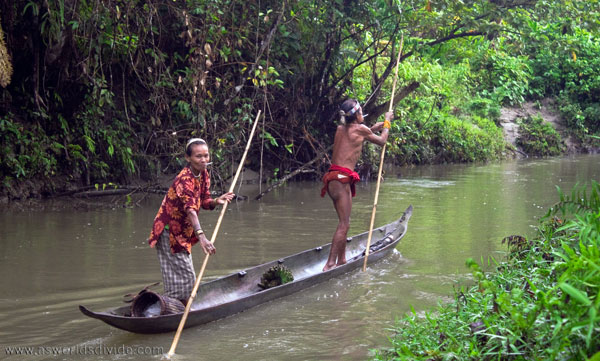
To give you a sense of what eventuated here and in the days ensuing I thought I’d share with you some sections of writing taken from my personal daily musings:
Heading up river I enquired the whereabouts of his brothers. Aman Jiji responded, “Most of the extended family is at the Uma so that if he dies they can be there with him.” He then asked, smiling with incredible sincerity, “If my father dies will you still come to visit us?” He then quickly moved on making comment on a completely unrelated matter. All smiles. It is quite amazing to experience – first hand – the way they deal with what appears to be a life-threatening situation. Adopting this approach, I’m trying to give as little thought as possible to what may or may not be. The forest is soothingly beautiful to watch pass by.
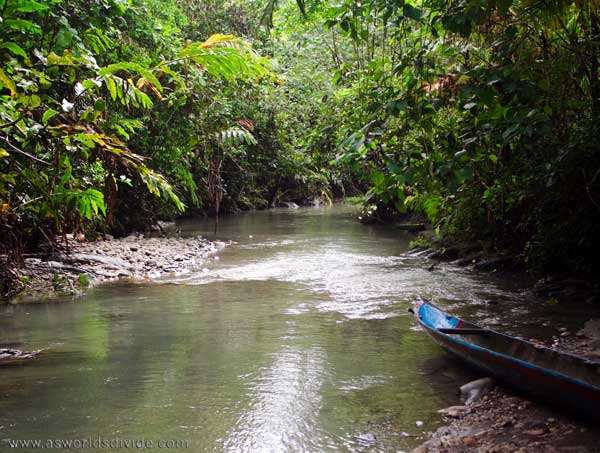
Aman Masit Dere is terribly ill. My heart fell away when I saw him. He can barely move. This powerfully strong-willed man is frail and hurting. He has barely eaten for two weeks. I feel sick. Sitting with him, watching his daughters holding him upright and, in small green leaves, catching the bile he continues to cough up, tears wanted desperately to well in my eyes. I held it back. Arla was unable. They were quick to comfort her “You can’t cry. He is not dead. He is still strong. We need to be happy. We can’t confuse him.”
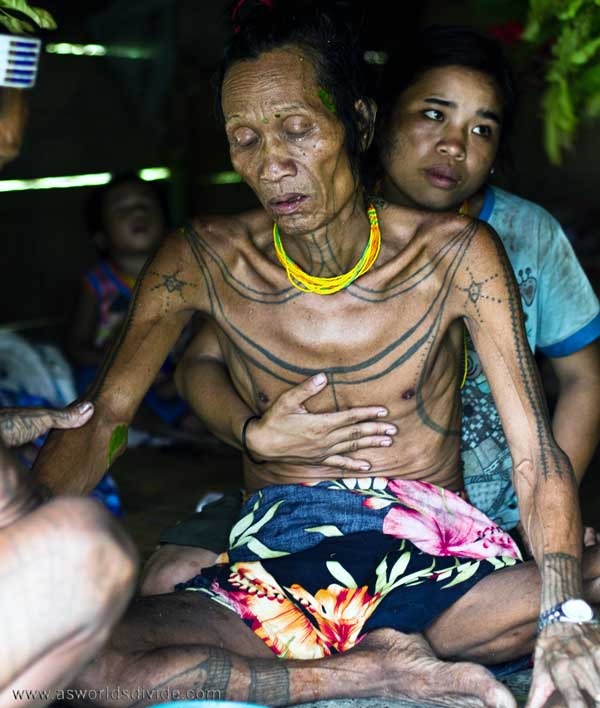

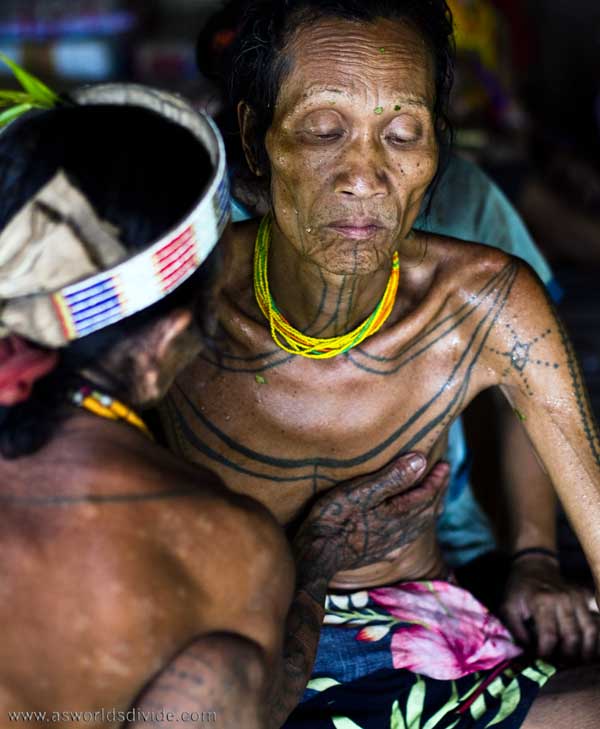
Five Sikerei were completing the final day of a Mentawai healing ceremony. We shared in the experience. They then asked for my advice. I suggested we take him down to the Puskesmas (medical clinic) in the port town as soon as possible. They don’t have any money. We will cover the costs. They agreed that, tomorrow, after completing the ceremony, we take him down river. I later managed to find some time alone. I cried for my friend. I will look into trying to extend my visa to stay on. Stay by his side.
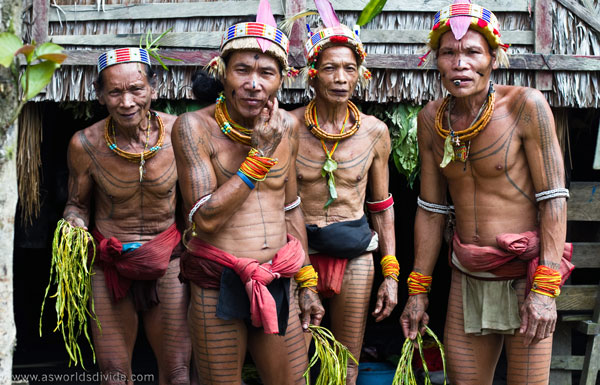
Aman Masit Dere almost passed away last night. He coughed an incredible amount and found it very difficult to continue breathing. We’re now in the Puskesmas. It was a long, slow commute down the river. He was in the arms of his siblings or children all the way. He is connected to a drip and has a breathing apparatus stuck up his nose. He looks too exhausted to show any fear for this foreign environment. We have set up camp in his room. Ten of us. Including his three youngest children. I’m moved – even more so than previously – by the love and support shown by his family. Such a powerful form of medicine. So tired.
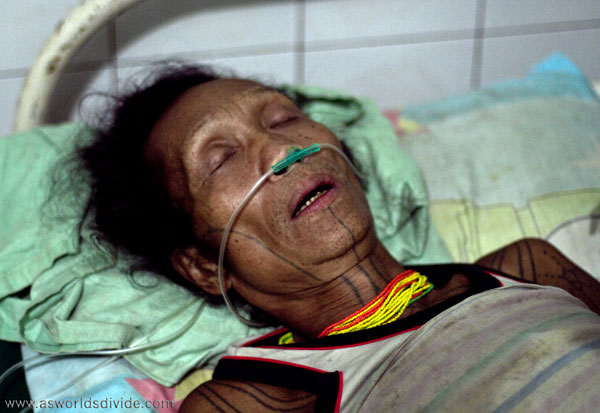
Long night. Breathing apparatus finishes its cycle every 40min so I need to switch it off then on each time. His drip control may have been tampered with and the first bottle was consumed too quickly. The second had stopped working by 5am and he was boiling up. There is nobody about so I have to locate and replace this myself. It is now 7.30am and he is in a lot of pain. The cough is killing him. Literally. The doctor should arrive in an hour or so to conduct tests. We wait. Watching his three youngest play and laugh on the other side of the room is a comforting respite.
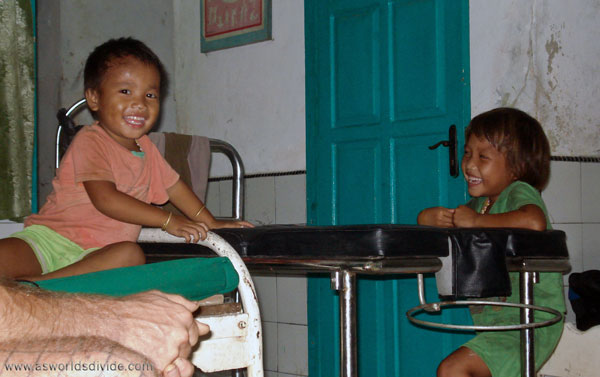
It appears we won’t know results until tomorrow morning. We have also been warned about the contagious effects of Tuberculosis. Which is what they suspect he has. This is a real concern when considering how close his family, including his young children, have been with him over the past few weeks. And no doubt will be in the coming. We too are at risk. Sleeping alongside him. Caring for him. I’d say we’d have had the vaccination though.

Still in the Puskesmas. Masit Dere is showing no improvement. Eating. But very little. Something rather unique occurred this afternoon. Sitting by the bed I noticed him start to say a few things. As one might do in their sleep. Though only moments ago he appeared awake. Soon enough he was talking. Very quietly.
His daughter, son and brother noticed too and quickly came to his side but without saying a thing or touching him they listened closely. Intently. I could see tears fill their eyes as they crowded around. For a small moment I thought he had fallen into a state of confusion. Dissolution. Perhaps nearing death. My stomach tightened as though it wanted to rid itself of air. I quickly settled myself and watched on. It had to be a visual. A conversation with someone from a past life. This is common to the role of Sikerei. And, as I’m later told, to the circumstance of being severely ill.
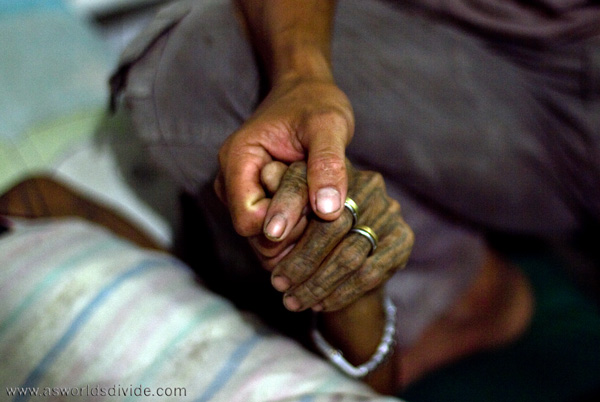
It was a good dream, they reported. Having another Sikerei, his brother, and others present helped to ensure he followed the right path. The path to recovery as oppose to that leading him to death. They seem more positive now.
Shortly after this Masit Dere came to and called me to come close to him. He spoke. The conversation was intense – trying to juggle concentration on hearing him, understanding him, and processing the seriousness of the circumstance with regards to what he was saying. An incredibly powerful moment. In many ways life changing. I don’t think I’d realized just how much I meant to him and his family. This conversation will stay with me forever.
Doctor, or nurse, I think, has informed us that yesterday’s sample wasn’t clear enough. They’ll need to do another. The family are getting very agitated. They don’t like it here. They’re not seeing any improvement with this medicine. They want to return to the forest. “If he shall die it must be in the forest. Not here.” “You tell us what we should do. If he dies that’s ok, not your fault, but we don’t like it here.”
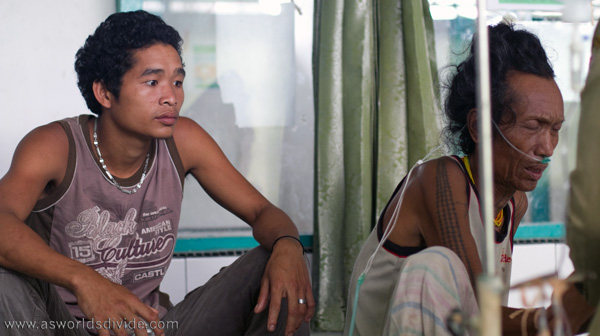
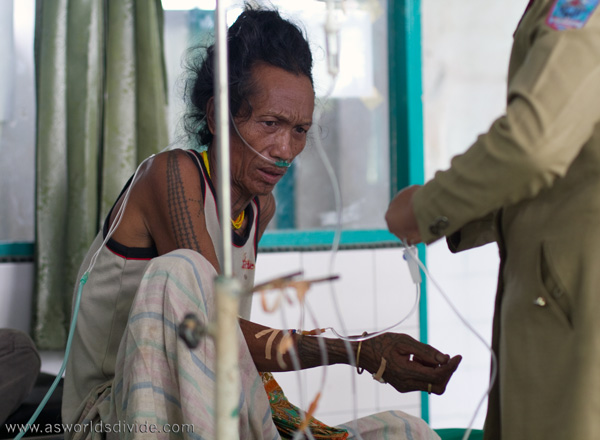
I’m advising we stay at least until tomorrow to find out what the illness is. I’m quietly confident he will be feeling stronger by tomorrow too. He has been eating a little more each day and has been on the drip for three days/nights now. I hope it’s soon though. This place is filthy. There’s already lot’s of itching and coughing going on. And now all the kids have some kind of flea in their hair.
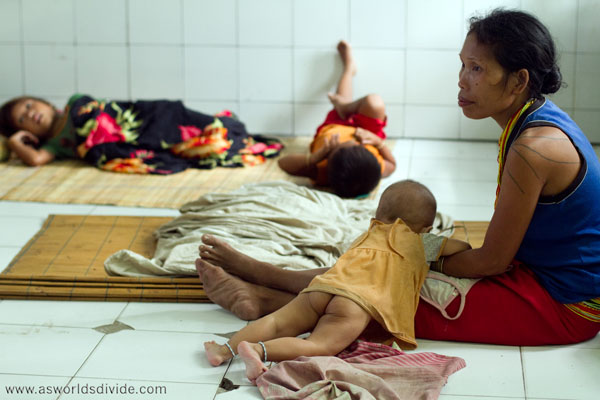
He is feeling a bit better today. He was up coughing a lot last night but he is getting his strength back. Results arrived. He has Tuberculosis. Which is curable. They’ve given us three weeks of medicine and he’ll have to travel to the nearest resettlement village for more each time he runs out. It’s a six-month packet.
Thankfully we are moving out of the Puskesmas and back to the community’s social accommodation house by the river. My visa expires tomorrow. It is too soon to leave him. We will make enquiries about getting my passport to the mainland.
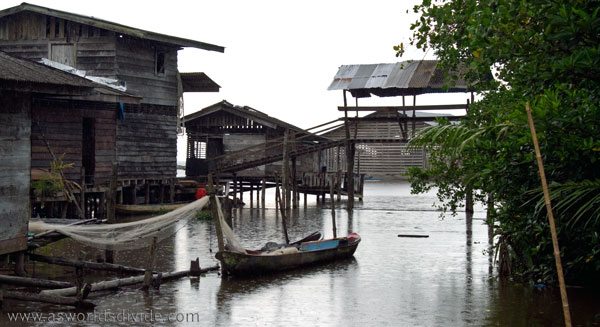
All fell into place. Masit Dere feeling stronger again today so we head back up river. What a moment arriving to the Uma. His second eldest daughter, Liana, who has been looking after the other children whilst we’ve been gone – including two of her own – has been running to the river for every canoe she hears approach. She‘s had no word of our whereabouts or about his condition. We’ve been away for five days.
Finally she sees that it’s us in the canoe. Their faces. The tears. The joy. Their father is still alive. Wow. It is truly amazing when life presents a scene of such raw happiness. So glad to be back here. Everyone is feeling the same. We spend the evening singing and talking and drinking tea and laughing. It feels a lot more like the evenings I’d become accustomed to.

Masit Dere grew stronger each day. By the time we left to head back to Australia he was eating well. The passion for life had slowly begun to return to his face. He now participated in conversation; projecting his customary spiels and tone that would lead you to think he’s arguing the world’s most important issue when it is in fact merely a discussion about collecting timber to build a new contraption. He has agreed to stay off the tobacco for the next few years at least and, I think, grasps the importance of needing to take the medicine everyday for the entire six-month period. It was an emotional departure.
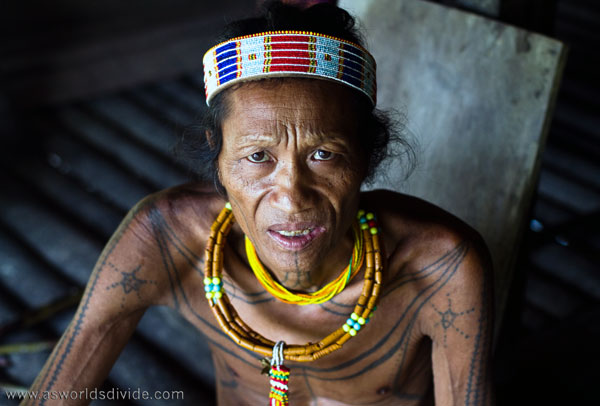
I guess the reason I felt this important to share relates back to a recent article I wrote discussing the methods by which the Mentawai community here deal with illness and loss of life and whether this contrasts against what, if any, actions need to be taken. This experience, coinciding with this effort to determine what is best for the community with regards to their situation, has indeed broadened but yet refined my views.
In particular, it has further highlighted the people’s positive attitude for accepting death as a natural form of life and that, despite the consequence, they feel safer within the confines of the environment they know and trust. But equal to this they do not want members of their family to die. And in cases such as this, which are quite common amongst these remote communities where they’re unable to afford costs for any other option, it’s possible that these deaths are prevented with minimal disturbance to their desires.
I’m unsure of the costs that would be involved in such an exercise, but, given what I know about the people and have learnt from this experience, it seems the most logical step would be to provide early immunisation against life-threatening and contagious diseases such as Tuberculosis. A simple vaccination. A needle given to each person within the comforts of their nearest village. I believe this would have almost no impact on their ongoing perceptions of survival here, but would most definitely save lives.
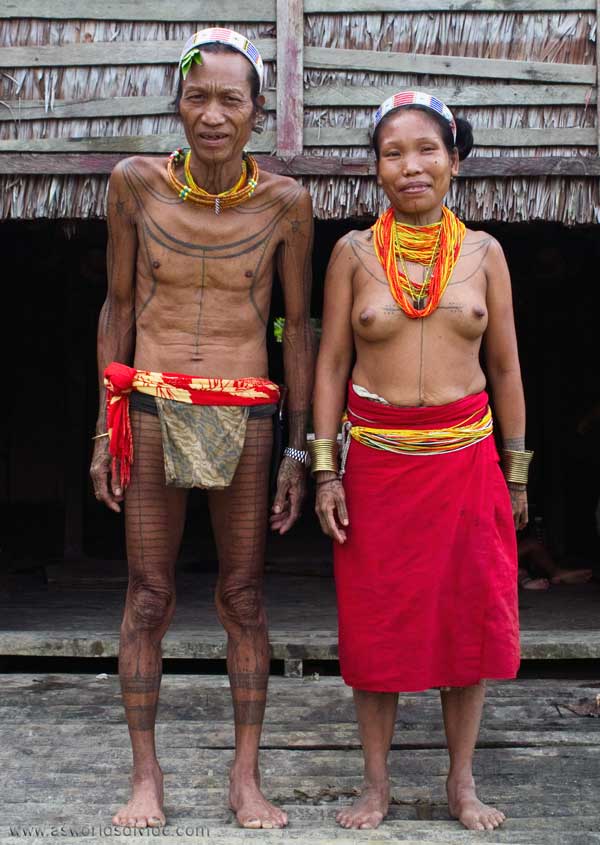
With regards to action, the program and foundation being developed as part of this project focuses more on education than specific medical health issues such as this – there are other experienced organisations that focus their work in this field. However I am eager, on the side, to further research the possibilities of working with others to help make this happen. So I ask, if any readers have access to experience, contacts, facilities, or just general advice with relation to helping achieve this, please make contact.
Whilst I don’t yet know much about the procedures involved in vaccination, I feel it would be foolish not to explore these pathways which arise that are ultimately leading to the one desired outcome for the livelihood of the Mentawai people. Thanks for reading.


Luke
Wow. Fantastic read Rob. Glad to hear there was a happy ending to the ordeal.
Nov 24, 2013 @ 1:39 pm
Whisnu
incredible. what a journey. Salute for you, Rob!
Nov 26, 2013 @ 10:00 pm
Rob
Thanks Luke and Whisnu.
Jan 13, 2014 @ 9:28 pm
Herwig Zahorka
Thank you for this wonderful story and the excellent photos. I hope he will regain full health again.
( A book of mine is now in the print in Germany, the title: Die Siberuter)
Feb 18, 2014 @ 11:37 pm
Rob
Likewise Herwig. Great to hear from you. I’ll keep an eye out for your book. Thanks and best wishes.
Feb 19, 2014 @ 4:25 pm
Floydgreen
Awesome story of your caring attitude for a friend and his people. what would a vaccine for a person cost? What organization works that region, would love to help this cause.
GeeDee.
Jun 01, 2017 @ 4:43 pm
Rob
Hi GeeDee, thanks for writing. It is not possible for foreign organisations to provide the people with vaccines, due to Indonesian law. The best solution is to empower the local health departments, which we’ve been trying to assist in via the work we do with our Indigenous Education Foundation. We are making some small inroads. Please contact us if you’d like to discuss further. Cheers
Jun 13, 2017 @ 3:37 am